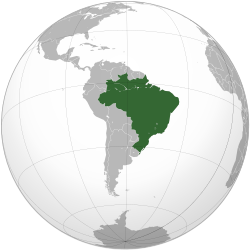MS 32077
Supreme Federal Court
Social Christian Party (PSC), "Partido Social Cristão (PSC)", entered on May 21, 2013, with action on Supreme Court of Brazil contesting the approval of same-sex marriage by National Council of Justice (CNJ), "Conselho Nacional de Justiça (CNJ)", and not by Supreme Court of the country. [2]
The minister Luiz Fux decided that the decision of the National Justice Council to legalize same-sex marriage was correct. With this, continues same-sex marriage valid in the country. [3]
National Justice Council
On May 14, 2013, the Justice's National Council of Brazil legalized same-sex marriage in the entire country in a 14-1 vote by issuing a ruling that orders all civil registers of the country to perform same-sex marriages and convert any existing civil unions into marriages if such a couple desires. [4] [5] [6] [7] [8] [9] Joaquim Barbosa, president of the Council of Justice and the Supreme Federal Court said in the decision that notaries cannot continue to refuse to "perform a civil wedding or the conversion of a stable civil union into a marriage between persons of the same-sex." [10] The ruling was published on May 15 and took effect on May 16, 2013. [11] [12]
Superior Court of Justice
On October 25, 2011, the Superior Court of Justice declared that the legal union of two women who petitioned the court could be recognized as a marriage. The decision of the Superior Court will only reach the authors of the demand, different of the Supreme Court with "stare decisis", but a precedent for other couples do the same request. [13]
Courts of States
Supreme Court legalized civil union on May 5, 2011. The Brazilian Law allows the conversion of civil union into a full marriage. Between 2011 and 2013, the Courts of 13 Brazilian States legalized same-sex marriage based on that. And finally, on May 14, 2013, the decision of National Justice Council legalized same-sex marriage nationwide. [14]


